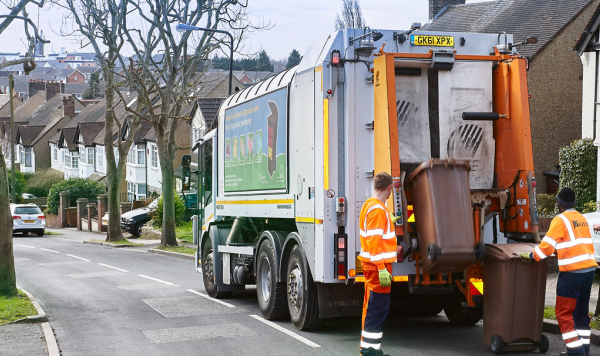Request
As a council tax payer in Haringey I noted the recent press article about Clyde Loakes concerns about Energy for Waste being liable for the Emissions Trading Scheme (ETS) tax on burning fossil based waste. https://enfielddispatch.co.uk/north-london-waste-authority-opposes-inclusion-of-incineration-in-uk-emissions-scheme
My understanding is that the ETS will be payable from 2028 by London Energy Ltd which will be passed on to NLWA who will increase the per tonne charge to the 7 Boroughs. Is this correct?
- Does the NLWA have an estimate for the reduction in waste tonnage when the Deposit Return Scheme and Extended Producer Responsibility schemes start and people are taking bottles and cans to be paid deposits. (stated by the recent Government as October 2025 https://www.gov.uk/government/publications/deposit-return-scheme-for-drinks-containers-policy-statements/deposit-return-scheme-for-drinks-containers-joint-policy-statement)?
- Does the NLWA have an estimate of the likely ETS charge per tonne of (fossil) waste? 3) Does the NLWA therefore have an estimate of the increase/decrease for burning waste in cost per Borough and per Council tax payer if ETS, DRS and EPR are all in place by 2028?
Response
Further to our email acknowledging your freedom of information request (reference 2024-235), our response is as follows.
You requested:
- Will the cost of ETS liable to LEL be recharged to the NLWA and the 7 boroughs?
- Does the NLWA have an estimate for the reduction in waste tonnage when the Deposit Return Scheme and Extended Producer Responsibility schemes start, and people are taking bottles and cans to be paid deposits?
- Does the NLWA have an estimate of the likely ETS charge per tonne of (fossil) waste?
- Does the NLWA therefore have an estimate of the increase/decrease for burning waste in cost per Borough and per Council taxpayer if ETS, DRS and EPR are all in place by 2028?
-
Will the cost of ETS liable to LEL be recharged to the NLWA and the 7 boroughs?
It is currently unknown at this stage how ETS liabilities will be charged once energy from waste facilities are included in the scheme. The recent government consultation requested stakeholders’ thoughts on different cost pass-through mechanisms. In its response to the consultation, NLWA called for the government to ensure that any mechanism chosen must be accurate, fair, and transparent.
-
Does the NLWA have an estimate for the reduction in waste tonnage when the Deposit Return Scheme and Extended Producer Responsibility schemes start and people are taking bottles and cans to be paid deposits?
NLWA has produced an estimate for tonnage reductions as a result of the Deposit Return Scheme (DRS). These estimates vary according to the effectiveness of the scheme once it is operational, and as a result have been calculated at the government target capture rates of 70% after one year of scheme operation, and 90% after three years. If 70% of DRS materials are captured, it is estimated that north London dry recycling would reduce by approximately 3,100 tonnes, and residual waste would reduce by approximately 8,000 tonnes. If 90% of DRS materials are captured, tonnages would reduce by approximately 4,000 tonnes for dry recycling, and 10,200 for residual waste.
Due to the lack of information currently available for Extended Producer Responsibility for Packaging (pEPR), as well as the unknown impact the policy will have on producer behaviour, estimates of the impact of north London’s tonnages as a result of the scheme have not been produced. However, it is estimated that approximately 62,000 tonnes of north London’s dry recycling, and approximately 96,000 tonnes of north London’s residual waste will be in the scope of pEPR. It should be noted that while NLWA and the north London boroughs will receive payments to manage this packaging waste, the material will remain within our waste stream. Consequently, any tonnage changes as a result of pEPR cannot be estimated.
-
Does the NLWA have an estimate of the likely ETS charge per tonne of (fossil) waste?
The ETS charge per tonne of fossil waste is likely to be tied to the carbon price as is the case for the facilities currently in scope of the ETS. This price is determined by the highly volatile carbon market which is influenced by a number of factors. As a result, it is not possible to predict what this will be once energy from waste facilities are in the scheme in 2028. For example, in August 2021, the carbon price was around £48 per tonne. This went up to around £89 in August 2022, and in August 2023 this went back down to around £43 per tonne.
-
Does the NLWA therefore have an estimate of the increase/decrease for burning waste in cost per Borough and per Council taxpayer if ETS, DRS and EPR are all in place by 2028?
While estimates have not been created on a per borough basis, NLWA has produced estimates of the overall potential cost of the ETS to the seven north London boroughs. This estimate varies depending on the carbon price, and is based on recent analysis suggesting that 42% of north London’s residual waste is fossil-based. An estimate of £60 per tonne of carbon would result in an additional £14,000,000 in costs for north London, which is the equivalent of an additional £21 per household per year, or an 0.84% average increase in council tax. A high carbon price of £150 per tonne of carbon results in an estimated £35,000,000 in additional costs, equalling an additional £51 per year for each household, or a 2.11% average increase in council tax. These estimates are dependent on the carbon price, composition of waste and volume of waste all of which are variable and not fully known because of the uncertainty of the collection and packaging reforms.
The significant and volatile costs associated with the ETS have led to NLWA and local authorities across the country calling on the government to recognise the impacts these additional costs will have on increasingly stretched local authority finances, and to ensure that payments received through EPR are increased to fully cover the burdens of ETS. More information on these calls to government can be found through the Local Government Association here: https://www.local.gov.uk/about/news/misfiring-incineration-tax-could-heap-billions-unfunded-costs-councils
If you are dissatisfied with the handling of your request, you may ask for an internal review, which should be submitted within two months of when you received our response to either informationrequests@nlwa.gov.uk or enquiry form quoting the above reference.
If you are not content with the outcome of the review, you may complain to the Information Commissioner, Wycliffe House, Water Lane, Wilmslow, Cheshire, SK9 5AF, or via their online portal. The Information Commissioner will not usually accept complaints before a review has been completed.


